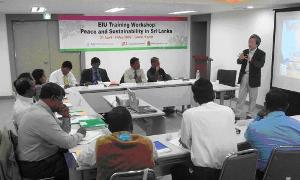|
|
Recent Activities of APCEIU: The Asia-Pacific Centre of Education for International Understanding
un article par Park Juyeon
"Transforming a culture of war and violence to a culture of peace"
Here are some of our recent activities.
In accordance with the Centre's mandate of strengthening the national and regional capacities in education for international understanding (EIU), APCEIU launched a three-year project (2006-2008) on Situational Analysis of education for international understanding and sustainable development in Asia and the Pacific region with a view to laying the groundwork for the development of EIU policy based on the situations and contexts of the region. With a sub-regional basis, the project was carried out in Central Asia and Northeast Asia in 2006, and Southeast Asia in 2007 respectively.
In 2008. APCEIU brings the project to the two remaining sub-regions, i.e., South Asia and the Pacific. In South Asia consisting of Afghanistan, Bangladesh, Bhutan, India, Iran, Maldives, Nepal, Pakistan and Sri Lanka, the field survey on the current situation of EIU is being carried out along with the Sub-regional Consultation Meetings for development of EIU Policy. As for the Pacific, a Workshop on EIU for Sustainable Development was organized by APCEIU in Nadi, Fiji in May. The workshop was attended by 18 educational experts from 13 Pacific countries namely: Australia, Cook Islands, Fiji, Kiribati, Nauru, Niue, Palau, Papua New Guinea, Samoa, Solomon Islands, Tonga, Tokelau and Tuvalu. The event included presentations, workshop, focus groups discussions, small group works and field visit. Presentations and discussions tackled the conceptual framework on how EIU relates to ESD, regional and local efforts to promote EIU and ESD and successful cases of EIU practices

click on image to enlarge
In other programmes, an EIU Training Workshop for Peace and Sustainability in Sri Lanka was held in May in cooperation with German Technical Cooperation(GTZ) and the Ministry of Education, Sri Lanka.
12 participants representing Ministry of Education(MOE), provincial ministry of education, zonal department of education, National Institute of Education(NIE) and GTZ from Sri Lanka explored Korean Educational system, curriculum, teacher training system through visits to related national education institute. Through sessions on conflict, tolerance, peace building through art approaches and sustainability, they shared opinions and experiences on peace education. They also had opportunities to visit to specific programme for peace in Korea.
In addition to this, APCEIU and SEAMEO Regional Center for Educational Innovation and Technology (SEAMEO INNOTECH) has organized a Study Visit Programme on "Strengthening the Promotion and Adoption of the Culture of Peace in the School Communities of DepED Region X" from 11 to 17 May 2008, Seoul, Republic of Korea.
15 participants were from the Department of Education, Philippines Region X that is composed of 12 cities of Mindanao. Led by Dr. Estrella A. Babano, Regional Director, Region X participants shared their valuable insights on peace education and youth issues with various Korean educational institutes and the civil society.
The programme consisted of visiting institutes including Korean Muslim Federation, Philippine Migrant Catholic Community of Seoul, and Korean National Commission for UNESCO, Ahimna Peace School, Ansan Borderless Village and Susong Elementary School for class observation.
The study visit was made with the request from the Philippines Department of Education (DepED) Region X to SEAMEO INNOTECH to conduct a benchmarking program in the Republic of Korea.
|








|
DISCUSSION
Question(s) liée(s) à cet article:
How do we promote a human rights, peace based education,
* * * * *
Commentaire le plus récent:
Question: what is the relation between peace and education?
http://cpnn-world.org/new/?p=4780
We teach the science of war on an even and equal basis with the 3Rs and we maintain it with more resources than any other school. Further, we have done this consistently for a couple of thousand years, long before education was institutionalized for all children. And we have never questioned the wisdom of teaching millions of civilians how to kill while never giving the same credence, or any for that matter, to the science of peace, the study of anti-war, of reconciliation. With this inured mindset leaders choose to fund boot camps and officer training colleges and by omission deprive youth of the better choice.
If we can teach war and violence with such commitment to suit the purposes of generals and the arms trade, where are the rest of us who have a greater need for peace and conciliation than anyone anywhere has for the killing fields? Why have civilians not demanded peace education long ago and why don't we have it now?

|
|









